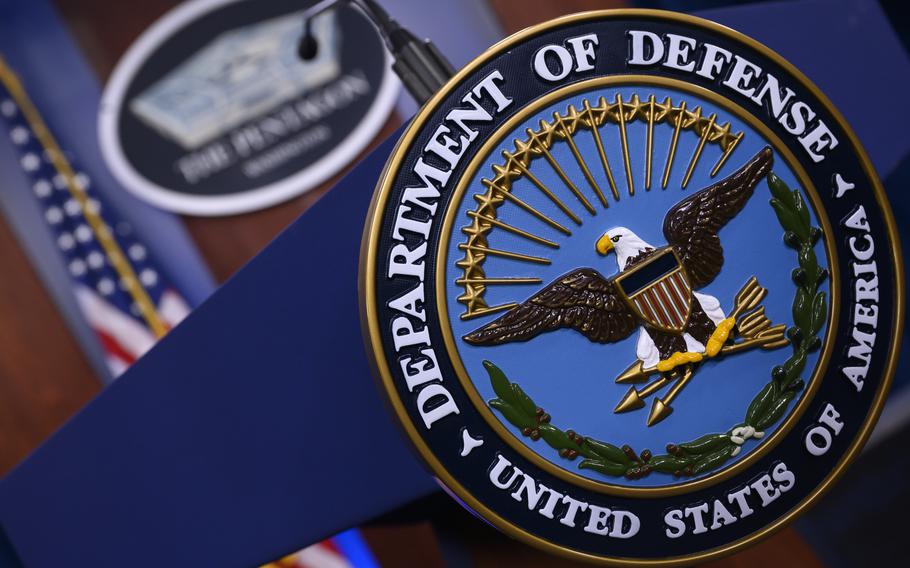
A Navy supervisor was cited for abuse of power after a recommendation to revoke a subordinate’s security clearance was determined to be an act of retaliation, a Defense Department inspector general investigation found. (Lisa Ferdinando/Defense Department photo)
WASHINGTON — A supervising Navy service member was cited for abuse of power after a recommendation to revoke a subordinate’s security clearance was determined to be an act of retaliation, a Defense Department inspector general investigation found.
The report from the Office of the Inspector General, which was released Oct. 15, detailed a series of events dating to Oct. 28, 2020, when an employee of the Navy Cyber Warfare Development Group informed his supervisor of a potential mistake in a report provided to the U.S. Fleet Cyber Command, U.S. 10th Fleet.
The supervisor later recommended the subordinate’s security clearance be revoked following months of initiating punitive action, which the report said “demonstrated animosity” toward the subordinate.
“Individuals must be free to come forward to make protected disclosures without fear of reprisal,” DOD Inspector General Robert Storch said in a statement. “A culture in which a [Defense Department] official uses a security clearance action as a weapon to silence those who report alleged wrongdoing is antithetical to this core principle. Whistleblowers should be commended for coming forward, not punished.”
The subordinate was a program manager from 2018-21 for the cyber command based at Fort George G. Meade, Md. The supervisor and subordinate were involved in a weekly project called Commander’s Update Brief, according to the report. The updates would indicate if a “mission area” was capable, partially capable or not capable.
The subordinate voiced concerns during an October 2020 meeting about misreporting signal intelligence missions as capable when they were not.
“We are not accurately reporting,” the subordinate reportedly claimed.
The supervisor responded: “There are some things you just don’t want people to know.”
Two witnesses interviewed by investigators who were also at the meeting were unable to recall the exchange between the supervisor and subordinate. The supervisor also claimed not to recall the exchange.
About a week later, on Nov. 5, 2020, the subordinate reportedly argued with an instructor during a training event about conducting queries. The supervisor directed a preliminary inquiry in response to the incident to determine if the subordinate had violated the Uniform Code of Military Justice. The supervisor spoke to two witnesses, who said the subordinate’s behavior “demonstrated his desire to circumvent policy and created confusion regarding which queries could be conducted within the boundary of law and policy,” according to the investigation.
The inquiry officer found on Nov. 20, 2020, that the subordinate did not violate the Uniform Code of Military Justice.
Despite the outcome absolving the subordinate of wrongdoing, the supervisor told investigators that the event caused a loss confidence in the subordinate.
On Dec. 10, 2020, the supervisor submitted a nonjudicial punishment for the subordinate, citing attempts to violate the Uniform Code of Military Justice and conduct unbecoming of an officer. The supervisor then suspended the subordinate’s access to “sensitive compartmented information” for demonstrating “an unwillingness to comply with current policy and rules governing computer network operations,” the report read.
In the supervisor’s report to the Defense Department regarding the suspension, he failed to include the findings of the preliminary inquiry.
On Dec. 18, 2020, the subordinate declined the nonjudicial punishment and requested a court-martial.
The supervisor submitted a report of misconduct to the Navy Personnel Command, asking for the subordinate to be detached for cause from the cyber command. A detachment for cause is when a service member is reassigned from a duty station before the normal transfer date, typically as the result of unsatisfactory performance or misconduct.
In the request, the supervisor inaccurately stated the subordinate had committed two military offenses in reference to the Nov. 5, 2020, training incident as a reason for the request, the IG report reads.
As part of the subordinate’s rebuttal to the supervisor’s detachment for cause request, he made two protected disclosures that accused the supervisor of abuse of power. The Personnel Command opted in July 2021 to detach the subordinate but disapproved of detaching him for cause.
The supervisor submitted a follow-up security access eligibility report in August 2021, again recommending the Defense Department revoke the subordinate’s access to classified information. In the recommendation, the supervisor continued to refer to the training incident, accusing the subordinate of attempting to influence a junior operator to perform a query that the operator believed to be in violation of policy and trying to circumvent policy. The supervisor omitted that the inquiry officer did not substantiate these allegations.
Additionally, the supervisor claimed the Personnel Command decided to reassign the subordinate but did not include the decision was not “for cause,” which the IG report said created an impression that this action was punitive.
“The [supervisor] appeared to selectively choose the information to create such an impression,” the report reads.
The inspector general investigation determined the evidence used to justify the removal of the subordinate’s security clearance was not strong enough, adding there was an abuse of authority and animosity toward the subordinate on the supervisor’s part.
The Defense Department Consolidated Adjudications Facility, which handles security access reviews, initially revoked the subordinate’s eligibility for access to classified information, but restored access after receiving his rebuttal.
On March 13, 2023, the Defense Department reinstated the subordinate’s access to classified information. The subordinate has since retired.
The supervisor is also retired but remains subject to potential disciplinary action.